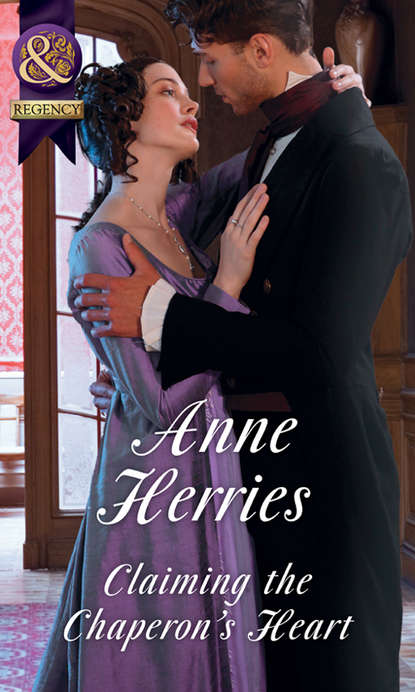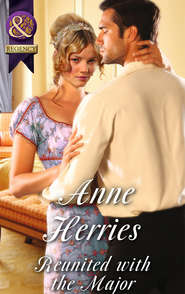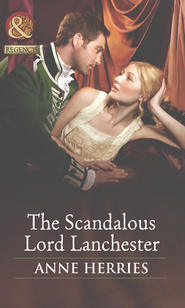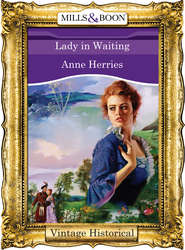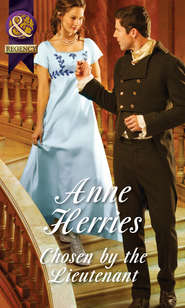По всем вопросам обращайтесь на: info@litportal.ru
(©) 2003-2025.
✖
Claiming The Chaperon's Heart
Настройки чтения
Размер шрифта
Высота строк
Поля
Then, as she saw the sun had risen in the sky, she knew it was too late. His ship was already on its way and because he wanted the rewards she had promised he would do her bidding... His death would be her sin.
Giving a cry of terrible despair, she fell senseless to the ground.
Chapter One (#ulink_6765c6c8-c45f-518e-86ee-94b83abf0c56)
‘Ah, letters,’ Viscount Salisbury said and looked at his elder sister Jane as she entered the room carrying a satisfying bundle. ‘Any for me, Sis?’
‘Yes, I think three,’ Jane replied with a twitch of her lips. ‘One of them smells of Miss Bellingham’s perfume... Now, what would a young lady of sense be doing writing to you, I wonder?’
‘None of your business, madam,’ her brother said and snatched at the envelopes she held tantalisingly out of his reach. Lady Jane March laughed delightedly and withheld the letters for a second longer before releasing them to the younger brother she adored. She was an elegant lady, tall and slender, something about her making her instantly light up any room she entered, though her beauty could not disguise the sadness in those wonderful eyes.
Jane had chosen to make her home with the brother she’d always favoured, after her husband’s untimely demise on the field at Wellington’s side. Harry had been one of the Iron Duke’s aides and so handsome it took her breath away, and his tragic death two years previously had broken her heart. The head of the family, John, Earl Sutherland, her half-brother, and his wife Gussie had offered Jane a home with them but she’d chosen to come here to William, her junior by just one year, because, as she said, Will was the only one who wouldn’t either treat her with kid gloves or bully her.
‘You will no doubt wish me the other side of the world within a month,’ she’d told Will when he greeted her on her arrival at what had been their father’s smaller country estate and was now his, John having inherited the main seat, of course. ‘But Gussie would have driven me mad—and you know what John is...’
‘I do indeed,’ Will said ruefully. ‘He’s such an old stickler. Poor dear Mama used to go in fear of him until she married Porky...’
‘God bless the Duke of Roshithe,’ Jane said with a wry smile. Their mother had become a much loved and spoiled second wife, outliving her first husband by some years. Indeed, she had remarried after Jane’s marriage because, she said, her dearest William did not need her help to find a wife. He had the fortune his maternal grandfather had left him, as well as the small estate from his father, consisting of a town house, a shooting box in Scotland and acres of land somewhere in Yorkshire. He was probably wealthier than his elder brother and never asked John to pay his debts, but that didn’t stop the earl giving him advice on how to manage his fortune on every possible occasion.
‘With your face and fortune, your problem will be in fending off the ladies rather than finding a bride,’ his mama had said before departing to the Continent with her doting second husband in tow for an extended wedding trip. Porky, as his friends and family persisted in calling him, despite his old and respected title, had been led by petticoat strings ever since Mama had taken him in hand and was blissfully happy to serve and adore her. He’d loved her all his life and been dismayed that her father had preferred the earl as a son-in-law; of course, Porky had never been expected to inherit the dukedom, and it was only after a string of unfortunate relatives met their deaths that he reluctantly came into it.
‘I’m damned if I want that mouldering old house of Roshithe’s,’ he’d said on hearing the news. ‘Of what use is the title and country seat to me? I never go near the place, never have and never will.’
‘You will accept it to please me,’ his lady said. ‘I shall take precedence over John’s wife—and that will not suit her consequence...’
To give him his due, Porky hadn’t uttered another word of protest. If it suited his lady to become the Duchess of Roshithe it would suit him—and he understood perfectly the veiled hints and slights she had suffered at the hands of the earl’s wife. Instead of complaining further, he’d given a grand ball, to which he’d invited anyone of consequence and it had afforded him a quiet amusement to see the countess having to curtsey to her mama-in-law, something she’d refused to do once her husband became the earl.
Jane and Will had watched their darling mama’s success in society with barely held mirth, for she did so enjoy it. As a young bride, married for consequence and money, Helen had suffered at her pompous husband’s hands as well as at the hands of his equally pompous eldest son, the child of his first wife—a lady of far greater family but less fortune. Helen had brought her husband a large dowry, but her father had been wise enough to tie most of it up so that it remained with her and her children after her husband died. Not that she needed it now for Porky was richer than any of them, perhaps one of the richest men in England—and he had little to do with his wealth but spend it on his bride and her children, Will and Jane. John, of course, was deemed to have enough of his own, though whether he would have agreed if asked was doubtful. He was far too polite to mention it, of course, though he frowned over the vast sums squandered on his stepmother’s vanity—as he called it.
Immersed in her letters, Jane became aware that Will was hovering. She looked up and smiled, because she knew her dearest one so well.
‘You want something,’ she said. ‘Come on, what is it?’
‘Dearest Jane,’ Will murmured, his blue eyes sparkling with mischief. ‘You know me so well... It’s Melia Bellingham. Her aunt has taken sick at the last minute and she won’t be able to come to London next month...unless you will be her chaperon, Jane? Please say you will. She’s been looking forward to this visit for so long...’
‘Amelia Bellingham shouldn’t have written to you, Will. Her aunt must write to me if she wishes me to chaperon her niece.’
‘I’m sure Mrs Bellingham’s letter is in your pile,’ he said. ‘You had such a lot. Why do you always get piles and piles of letters? I never get more than two or three and most of them are just bills...’
‘Perhaps because I write lots of letters,’ Jane said, her mouth quirking at the corners. ‘It is my chief occupation most of the time—unless we go up to London to visit Mama and then it’s just non-stop balls and dinners and all the rest...’
‘Mama loves to entertain, and she has so many friends.’
‘Of course she does,’ Jane said drily. ‘They queue for the lavish dinners Porky puts on. It beats me how Mama can be exposed to all that rich food day in and day out and never put on so much as a pound.’
‘Because she eats like a bird and always did,’ Will said. ‘You’re just like her, Jane, and will never put on weight. You will invite Melia to stay with us, won’t you?’
‘Of course, if you wish it,’ Jane agreed. ‘It’s your house, my dearest. I’m your guest and I dare say you may invite whomever you wish...’
‘You know I couldn’t invite Miss Bellingham,’ Will said. ‘She must have a chaperon—and you’ve known her all her life, practically grew up together.’
‘Her elder sister was my friend,’ Jane said and a sigh escaped, because her friendship with Beth Bellingham brought back memories of Harry. Beth had been in love with him, as had most of the young girls that season...but he’d only had eyes for Jane, and she missed him so much, so very much. Sometimes in the night the ache was like a sword thrust in her chest. ‘I like Melia, Will—and I’ll be glad to invite her.’ She shuffled through her letters and opened the one from Melia’s aunt, nodding as she rose to pen an immediate answer. That done, she rang the bell and gave her letter to the footman. ‘Have that one sent immediately please, Flowers.’
‘Yes, my lady,’ the footman said, inclining his head correctly. Only the very observant might have seen the look of devotion in the man’s eyes as he bowed and left the room. Will knew that all the servants adored Jane. It wouldn’t make things easy for his wife when he married, because Jane was undoubtedly the mistress here—and he’d been glad of it until he began to realise that he was actually thinking of marriage.
‘So?’ Jane asked as she rose from her elegant chair and closed the writing desk she’d brought with her on her return from France. ‘Am I to wish you happy quite soon?’
‘Well, if Melia is of the same mind when she’s had her season, yes,’ Will said. ‘You do wish me happy, Jane? I know it makes things awkward for you...’
‘Nonsense,’ she said. ‘I’ve taken advantage of your good nature for too long. I have a perfectly good house of my own a few miles from John and Gussie and I shall probably take a house in Bath once I decide to settle. I should have done it a year ago, when I put off my blacks.’
‘But how can you live alone?’ her brother asked. ‘I know you don’t want to live with John, but Gussie isn’t too bad—or Mama...’
‘I wouldn’t dream of treading on her toes,’ Jane said, laughing softly. ‘And you know Gussie would drive me mad within a fortnight...’
‘You could stay on here. Melia likes you so much...’
‘And I like her and I want it to stay that way,’ Jane said gently. ‘No, my dearest brother, I shall not make your wife’s life difficult. It’s quite simple; I must find a companion...’
‘Well, I suppose—but who is there that you could put up with? You’re not the most patient of women, Jane.’
‘I am not in the least patient,’ she said. ‘But—do you remember Cousin Sarah? You might not recall her because you were away at school when she came to stay. It was shortly before Papa died...’
‘I seem to remember her at the funeral. She was tall and thin and plain...and her mother was always demanding things, making her life hell.’
‘Yes, well, Aunt Seraphina died last month and Cousin Sarah wrote to me asking if I knew of a position that would suit her. I was thinking of asking her on a visit to see how we got on—and, if we can bear each other, I shall set up house with her in Bath.’
‘But can you imagine what John would say to such a suggestion? Sarah Winters could never be a chaperon for you, Jane. She isn’t old enough and she has no consequence.’
‘And needs none in my house. I was married for a year before Harry died,’ Jane said, her face pale. ‘I am Lady March, a widow of independent means, and that is exactly how I intend to live...’ She arched her fine dark brows as he stared at her. ‘After the freedom of marriage and then living here with you—do you really think I could live with John and his wife?’
Will stared at her for a few minutes and then nodded. ‘Of course you couldn’t, Jane—but they will all be against it, even Mama.’
‘Mama wants me to marry again, Will. If I went to stay with her she would present me to all the eligible men she knows, and keep on doing it until I gave in. I married for love and would never marry for any other reason—indeed, I value my independence.’
‘You don’t think it might be a better arrangement to marry someone you could admire if not love? You would have a large house and a husband to help you...’
‘I couldn’t even think of it yet,’ Jane replied and her throat tightened. ‘I know it’s a year since I came out of blacks, but I still grieve; I still think of him all the time and wish...’
‘Of course you do and I’m a brute to suggest anything that upsets you, love. Please forgive me.’
Will was sincere in his apology and his sister was pleased to tell him there was nothing to forgive. They parted on good terms, Jane to write to Cousin Sarah, and Will to ride his new young horse that he had great pleasure in schooling. It had taken him a while to tame the brute, but it could go like the wind and he’d a mind to race the young stallion, riding him himself, of course. He was whistling as he strolled down to the stables, content with his world, which looked like continuing in the same happy-go-lucky way it always had.
Will was lucky. Everyone said so and he saw no reason why his luck shouldn’t continue. Melia would marry him and be content to live in the country, apart from a few visits to town, which was exactly the way he wished to live...
* * *
‘Oh, look, dear Aunt—’ Melia Bellingham opened her letter from Lady March and her deep blue eyes lit with excitement as she showed the very fine calligraphy to the lady, who had now recovered enough from her illness to sit in a chair but was still far too fragile to contemplate taking a lively young woman to London. ‘You will not mind my leaving you here alone? Please say I may go—for I am sure I am of little use to you. You always say I make your head ache, Aunt Margaret.’





